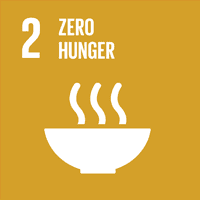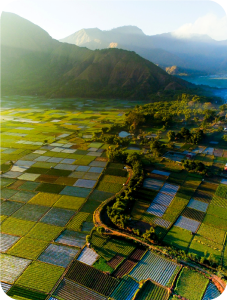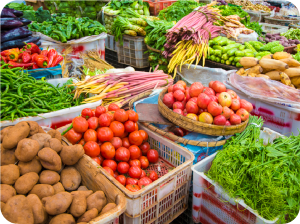
UGM SDG 2 REPORT:
END HUNGER, ACHIEVE FOOD SECURITY, IMPROVED NUTRITION AND PROMOTE SUSTAINABLE AGRICULTURE
“STUDENTS AND STAFF ARE ENTITLED TO RECEIVE STAPLE FOOD”
UGM staff and students can benefit from healthy and nutritious food support programs, which are part of the university’s efforts to address hunger. According to Rector Regulations No. 4 Year 2022 and University Policy on General Financial Standard No. 2, all staff are entitled to a meal allowance, in addition to food assistance such as rice valued at IDR 120,000 per month. Additionally, individual departments and research centers, like UGM PSKK, contribute by distributing sembako, or ‘nine basic necessities’, to their employees and extended staff.
Ensuring that throughout their academic journey, students receive ample and nutritious food at an affordable cost, is a top priority for UGM. On-campus markets and cafeterias play a crucial role in maintaining good health, going beyond merely offering food and beverages. UGM encourages these facilities to offer a variety of food options that meet the nutritional needs of all personnel. This includes incorporating organic and locally grown foods and vegetables. Additionally, these markets and cafeterias must uphold high standards of hygiene to meet the health standards of the academic community.
UGM will even go one step further to support its students by providing complimentary meals during exam periods, ensuring they are well nourished and physically prepared. Several faculties are participating in this initiative. For instance, the Faculty of Social and Political Sciences offers the “Fisipol Free Breakfast” program, which serves free breakfast to students during finals. Similarly, the Faculty of Biology hosts the “Sarapan Pagi” program at the Jasmine Corner Canteen, offering breakfast to students.
“JOINING FORCES WITH FARMERS AND LOCAL COMMUNITIES TO SECURE THE FUTURE OF FOOD”
UGM will even go one step further to support its students by providing complimentary meals during exam periods, ensuring they are well nourished and physically prepared. Several faculties are participating in this initiative. For instance, the Faculty of Social and Political Sciences offers the “Fisipol Free Breakfast” program, which serves free breakfast to students during finals. Similarly, the Faculty of Biology hosts the “Sarapan Pagi” program at the Jasmine Corner Canteen, offering breakfast to students.

Through workshops, innovation houses, and collaboration projects with the government, the university can connect with farmers and local communities to help build the nation’s food security. UGM has organized numerous events and plans to continue these efforts, fostering discussions and sharing knowledge on farming and food production.
The Agro-Cluster Faculties, such as the Faculties of Agriculture, Agricultural Technology, and Veterinary Medicine, maintain annual programs which aim knowledge and technology related to food security and sustainable agriculture are effectively transferred to and can be accessed by local farmers and food producers. If they wish to, local communities can receive training programs directly from UGM’s Center for Agrotechnology Innovation (PIAT) on food crop agriculture and horticulture, waste processing, as well as post harvest and marketing.
Among the skills taught, participants will make organic pesticides from spices. This is part of PIAT’s targeted programs to reduce inorganic pesticides usage to create sustainable agriculture and ensure food safety for consumers. Farmers and local communities can also train to become breeders of high-quality seeds, crucial for ensuring food security at both local and national levels. The university also provides assistance aimed at developing livestock feed to address shortages during dry seasons. Additionally, through compost fertilizer assistance, PIAT aims to help farmers and local communities increase crop yields, thereby boosting their income.

Overall Report for SDG 1 to 17
UGM annually reports its achievements in implementing “Tri Dharma” and its contribution to society through Dies Natalis UGM, which is conducted at the end of each year by inviting all academic staff and students as well as the university’s partners. UGM also publishes a Sustainable Development Report annually.
- UGM’s SDGs Report 2023
